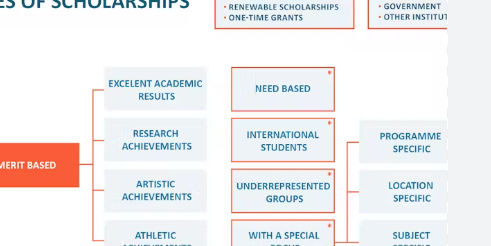The Scholarship Search: Tools, Resources, and Strategies for Success

Searching for scholarships can be a daunting task, but with the right tools, resources, and strategies, you can increase your chances of success. Here’s a comprehensive guide to help you navigate the scholarship search process: Start Early: Begin your scholarship search as soon as possible, preferably in your junior year of high school or even earlier. Many scholarships have early deadlines, and starting early gives you more time to find and apply for opportunities. Use Online Databases: There are numerous online scholarship databases and search engines that can help you find scholarships tailored to your interests, background, and qualifications. Some popular ones include: Fastweb Scholarships.com College Board’s Scholarship Search Cappex Peterson’s Unigo Check with Your School: Your high school
guidance counselor or college advisor can be a valuable resource in your scholarship search. They may have information about local scholarships, as well as institutional scholarships offered by the colleges you’re interested in. Explore Community Organizations and Businesses: Many local businesses, community organizations, religious institutions, and civic groups offer scholarships to students in their area. Check with these organizations to see if they have any scholarship opportunities available. Research Specific Criteria: Look for scholarships that are specifically tailored to your demographic, interests, talents, or intended field of study. There are scholarships available for a wide range of criteria, including ethnicity, gender, academic achievement, athletic ability, artistic talent, and more. Read
Eligibility Criteria Carefully: Before applying for any scholarship, make sure you carefully read the eligibility criteria to ensure that you meet all requirements. Applying for scholarships that you’re not eligible for is a waste of time and effort. Prepare Your Materials in Advance: Many scholarships require similar materials, such as transcripts, letters of recommendation, essays, and personal statements. Prepare these materials in advance so that you can quickly apply for multiple scholarships without having to start from scratch each time. Stay Organized: Keep track of all the scholarships you’re interested in, their deadlines, and the materials required for each application. Create a spreadsheet or use a planner to stay organized and ensure that you don’t miss any deadlines. Customize Your Applications: Tailor
your scholarship applications to each specific opportunity. Personalize your essays and statements to highlight how you meet the criteria and why you’re a strong candidate for that particular scholarship. Proofread Your Applications: Before submitting any scholarship applications, thoroughly proofread all of your materials to check for errors in grammar, spelling, and punctuation. Typos and mistakes can detract from your application and reduce your chances of success. Follow Instructions: Make sure to follow all instructions provided by the scholarship application process. Failure to follow instructions could result in your application being disqualified. Apply, Apply, Apply: Don’t be afraid to apply for as many scholarships as you can. The more scholarships you apply for, the greater your chances of receiving financial aid for your education. Stay Persistent: Receiving scholarships often requires persistence and perseverance. Keep
searching for opportunities, applying regularly, and don’t get discouraged by rejections. Be Aware of Scams: While most scholarship opportunities are legitimate, be cautious of scholarship scams that ask for money or personal information upfront. Research the scholarship provider and make sure they are reputable before applying. By utilizing these tools, resources, and strategies, you can effectively navigate the scholarship search process and increase your chances of securing funding for your education. Good luck!Here are some additional tips and strategies for success in your scholarship search: Network: Reach out to teachers, mentors, family friends, and community leaders who may have knowledge of scholarship opportunities or be willing to provide recommendations or guidance in your search. Utilize Social Media: Follow scholarship providers, organizations, and educational institutions on social media platforms like
Twitter, Facebook, and LinkedIn. They often post about scholarship opportunities and application deadlines. Consider Alternate Sources: In addition to traditional scholarships, explore alternative sources of funding such as grants, fellowships, internships, and work-study programs. These can also help offset the cost of your education. Think Outside the Box: Don’t limit yourself to conventional scholarship criteria. Look for unique scholarships that may align with your hobbies, interests, or unconventional talents. For example, there are scholarships for gamers, writers, entrepreneurs, and even tall people or left-handed individuals. Seek Feedback: Before submitting your scholarship applications, ask teachers, mentors, or family members to review your materials and provide feedback. They can offer valuable insights and suggestions for improvement. Apply for Local Scholarships: Local scholarships offered by community organizations, businesses, and foundations may have fewer applicants than national scholarships, increasing your chances of success. Attend local
scholarship fairs or check with your local library for information on available opportunities. Reapply for Scholarships: If you applied for a scholarship in the past but were not selected as a recipient, consider reapplying in subsequent years. As you continue to gain experience and accomplishments, you may become a more competitive candidate. Seek Institutional Aid: Research the financial aid offerings of the colleges and universities you’re interested in attending. Many schools offer merit-based scholarships, need-based grants, and other forms of institutional aid to help offset tuition costs. Maintain Academic Excellence: Strong academic performance can make you eligible for a wide range of scholarships. Focus on maintaining a high GPA, excelling in standardized tests, and participating in extracurricular activities that demonstrate your commitment to learning and personal growth. Apply for Scholarships with Rolling Deadlines: While
many scholarships have fixed deadlines, some have rolling deadlines, meaning they accept applications throughout the year until all funds are distributed. Keep an eye out for these opportunities and submit your application as soon as possible to maximize your chances. Celebrate Small Wins: Even if you don’t receive a large, full-ride scholarship, remember that every bit helps. Winning smaller scholarships can still make a significant difference in reducing your overall college expenses. Stay Organized After Winning: If you’re fortunate enough to win scholarships, keep track of any renewal requirements, such as maintaining a certain GPA or completing a specified number of community service hours. By incorporating these additional strategies into your scholarship search process, you can cast a wider net and increase your likelihood of securing funding for your education. Keep persevering, stay proactive, and don’t hesitate to reach out for assistance when needed.





